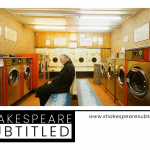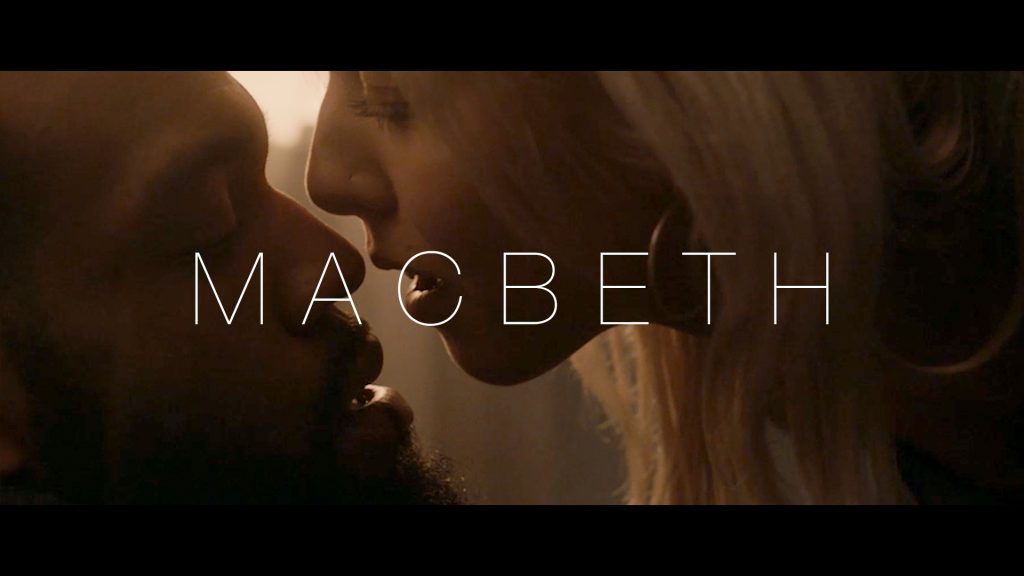
Daryl Chase: Shakespeare Subtitled
23rd July 2024
Film director and BSA member Daryl Chase shares his project Shakespeare Subtitled and the ‘what’, ‘how’, and ‘why’ of the project.
Shakespeare Subtitled is a passion project, the seed of which was sewn around fifteen or more years ago.
‘How?’. ‘Why?’. More of that later. First the ‘What?’.
Shakespeare Subtitled is an ongoing series of filmed extracts designed to inspire, entertain and educate. Original language performances are complemented by modern language subtitles, providing a jumping-off point for further exploration of Shakespeare. The project encourages both conventional and unconventional approaches to Shakespeare’s work, from diverse casting to unusual locations. Experimentation and play are welcomed in order to discover new meanings.
Films can be watched with or without subtitles, depending on your reason for watching. This is because Shakespeare Subtitled is not only about subtitles and language, it’s about the process of filmmaking. Whether in the classroom or on a film set there’s a thrill in asking questions; what if we set this somewhere unusual? What if we cast against type? What does it do to the sentiment? Does it speak to modern issues?
Shakespeare Subtitled extends its filmmaking focus by also celebrating the incredible wealth of talent out there, both in front and behind the camera. From those just starting out, to established names, the project is open to all and collaboration is key.
As well as entertainment, Shakespeare Subtitled embraces education, offering workshops, supporting materials and other content. It also ranges from the creation of new films to the use of existing ones, and spans all age groups. With a background in social enterprise filmmaking, I am also interested in engaging with underrepresented demographics and alternative provisions.
The project has ambitions to apply these principles to long form adaptations of full plays, also featuring original language performances with modern language subtitles.
So… that’s the ‘What’. How about the ‘Why’ and ‘How’?
Growing up I had a fascination with film, (no doubt inspired by my dad watching endless rented VHSs). However, with no connection to the industry I would sit in the local library with Kemp’s International Film and Television Directory and note down company phone numbers. Returning home I would call them all asking for work experience – old skool! Finally, one agreed to take me on and I was hooked. I became a runner, an editor, I shot my own shorts, music videos and anything else I could point a camera at, until eventually I was lucky enough to make commercials and films for a range of brands. Despite this, I was always keen to work on a more personal project, something that embraced the joy of filmmaking, inspired by my love of just ‘making stuff’. Initially I toyed with the idea of monologues – regularly released films with a range of actors – but it felt like it was missing an edge. So instead it sat with me for years, like an ear worm.
Fast forward many (many!) years later, and I was fortunate enough to be offered the chance to direct a social enterprise adaptation of Macbeth. This was an incredible opportunity to work on a production that engaged with underrepresented demographics and socioeconomically challenged young people, giving them opportunities within the film industry. Having personally experienced the challenges of entering the industry, I was keen to help those facing far more obstacles than I ever did. But – and it was a big but – the prospect of adapting and directing Shakespeare filled me with fear. The last time I had engaged with such a text was for GCSEs, and I’d found it challenging then! Despite this I accepted, hiding my nerves as best as I could and adhering to the mindset that you need to do things that scare you as otherwise you aren’t pushing yourself.
I got all the books I could, and began working hard on the text. Very quickly I felt like I did when I was back at school; struggling with the ‘words’, but too afraid to speak up. Whether it’s my own perception or not, there resurfaced an underlying expectation (this time within myself) to ‘understand’ the words, and a fear of the reactions of others if I admitted I didn’t. This time, older and supposedly wiser, I assessed the challenges in a different way. If I was asked to adapt a French, Spanish or German text I would be taught the language first, or be offered an initial translation. To me, the language of Shakespeare is similar, in that it is in some part a foreign language. I also then considered my own workplace experience and the foreign language films I watch… for those I immediately turn on the subtitles. I don’t assume the subtitles are word perfect translations, but combined with performance and visual language they help towards understanding. So, what if I could do the same with Shakespeare? Could language barrier solutions – subtitles – combine with performance to give me an initial, simple foothold upon which to build and explore.
It was then that I remembered the ‘monologues’ idea. Shakespeare is obviously filled with incredible monologues, sonnets, soliloquies and all manner of predominantly single character dialogues. And so the fledgling concept of Shakespeare Subtitled began.
Armed with the footage from Macbeth, I secretly began playing with modern language subtitles. Coincidentally, there were increasing press articles around subtitling – a higher percentage of younger viewers were using them as a matter of course (Youngs, 2021; Kelly, 2022) , plus Stranger Things was getting notoriety for embracing highly descriptive language (Bitran, 2022). This inspired my exploration further, and as I added the subtitles I found myself understanding scenes I hadn’t before. Performance, location, costume and other elements had already brought new meaning to the text, but modern words added even more understanding for me. They were not definitive ‘translations’, but they were a starting point for personal exploration.
Wanting to test the concept further, I shot some extracts specifically for the project, enlisting a few extremely generous and highly talented actors and friends. Each piece proved to be a joy to create… and with ‘joy’ being one of the motivations for starting a personal project in the first place, this was a success for me. They came alive, forcing me to dig deeper into the text, collaborate and experiment. Interestingly, in a recent (and brilliant), BSA teach meet, run by the fantastic Karen McGivern (BSA Trustee and Chair of Education Committee), I heard this concept summed up perfectly by Jennifer Kitchen when she quoted Gibson: “Shakespeare wrote his plays for performance and… his scripts are completed by enactment of some kind” (Gibson, 2016, p. viii). I couldn’t agree more. Traditional film scripts can also be hard to read. Bereft of detail, they are blueprints, stripped back to their bare bones. Practitioners then add the additional layers needed to come alive. Shakespeare is no different. This also speaks to the previously mentioned fact that these films and the project itself operate beyond the subtitles and language focus. Although these are a key creative elements, I am also inspired and excited by the questions filmmaking asks of text, and how different meanings can be offered via imagery and performance.
With these test extracts in tow, I contacted Maria Shmygol (Joint Chair of the BSA), who I’d met through the campaign to complete Macbeth. I was keen to assess if what I was doing had any merit in the eyes of those who really knew Shakespeare. Maria kindly didn’t laugh me out of the room and just as helpful as she had been on Macbeth, this time putting me in contact with Karen McGivern, who in turn, not only generously invited me to the BSA Teach Meets, but also shared her thoughts on the project. Karen opened my eyes to the usefulness of my filmmaking background, and that it shouldn’t be taken for granted regarding the skills that could be passed on to others and the way it gives value to the project, on a par with the language focus. What is most inspiring is that the approach Shakespeare Subtitled takes seems to have some similarities to the processes others have taken in classrooms, embracing a more active approach to the teaching of Shakespeare. I believe I would have benefitted more when I was young had there been more active ways to explore Shakespeare, combining it with drama, filmmaking, photography and other disciplines to bring it to life.
Shakespeare Subtitled was launched recently, with help from the BSA Small Grant Fund, for which I am hugely grateful. I am under no illusion that it could be a ‘Marmite’ project. Am I suggesting I know better by offering subtitles? I’m no Shakespeare expert so no. Am I trying to ‘dumb down’ the language? I believe not, because by celebrating the original language audibly, alongside the modern language visually, I’m avoiding pure simplification. Combining this with the idea that these films are not focused on language alone, the results are an exciting exploration of text resulting in a broad range of interpretations. Current examples, released and unreleased, include Lear in a Launderette, enduring a storm of the mind (more manageable to capture than a storm on a heath!); Brutus lurking behind the scenes of Caesar’s 1980s campaign trail; Petruchio hinting at domestic abuse; and a female Hamlet drinking from a can on a beach. All of these exist from collaborative questioning of the text. Whether the subtitles are then written in the contemporary English or in modern slang, the films themselves stand alone and focus on the joy of ‘making’, as originally intended. The project has exciting and wide-reaching ambitions and is open to any conversations regarding involvement in the exciting journey ahead.
Shakespeare Subtitled can be found on the following platforms, please share, follow, subscribe, and like.
Wesbite: www.shakespearesubtitled.com
Instagram: https://www.instagram.com/shakespearesubtitled/
Twitter/X: https://x.com/shakespearesubs
Facebook: https://www.facebook.com/shakespearesubtitled
Thanks
I would like to thank the BSA for their fantastic support, in particular Maria Shmygol for offering thoughts, support and kindly connecting me to Karen McGivern, to whom I also owe a huge thanks. I’m grateful for your opinions and welcoming me into the Teach Meets, both of which will no doubt continue to help shape the project. I would also like to thank all the attendees I’ve met in the sessions, whose openness about their own work has been invaluable. I highly recommend attending the Teach Meets, whether in education or not. They are a window into engagement practices that are enlightening whatever your connection to Shakespeare. I would also like to thank Kat Hipkiss for making sense of the sludge of words I sent for this piece. Lastly, thanks to anyone who has been involved in the project and films until now, you have made it great, and most importantly you have made it a joy to be part of.
Works Cited
Bitran, T. (2022) ‘Meet the Wordsmiths Behind the Genius ‘Stranger Things’ Season 4 Subtitles’, Tudum by Netflix, 8th July. Available at: https://www.netflix.com/tudum/articles/stranger-things-season-4-captions [Accessed 22nd July 2024]
Kelly, G. (2022) ‘How Generation Z became obsessed with subtitles’, The Telegraph, 24th July. Available at: https://www.telegraph.co.uk/tv/0/how-generation-z-became-obsessed-subtitles/ [Accessed 22nd July 2024]
Youngs, I. (2021) ‘Young viewers prefer TV subtitles, research suggests’, BBC, 15th November. Available at: https://www.bbc.co.uk/news/entertainment-arts-59259964 [Accessed 22nd July 2024]
Header image courtesy of Daryl Chase.


